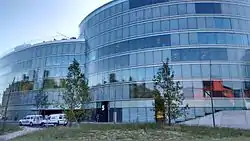DCAF
DCAF - /ˈdiˌkæf/; Geneva Centre for Security Sector Governance is a Swiss-based organization whose vision is a world in which human and national security are provided within democratically governed, accountable, and effective security sectors. DCAF believes that good security sector governance and reform (SSG/R) is a decisive contributor to peace and sustainable development.
 DCAF headquarters at Maison de la Paix, Geneva | |
| Founded | October 2000 |
|---|---|
| Type | Foundation under Swiss law |
| Headquarters | Maison de la Paix Geneva, Switzerland |
| Offices | Addis Ababa, Bamako, Banjul, Beirut, Brussels, Kyiv, Ljubljana, Niamey, Ramallah, Skopje, Tegucigalpa, Tripoli, Tunis |
| Member States | 60 states and the Canton of Geneva (2020) |
| Director | Ambassador Thomas Guerber |
| Staff | 203 (2020) |
| Web Address | dcaf |
| Budget | 32 million CHF (2020) |
Over 20 years since its inception, DCAF has supported national partners to implement SSG/R in over 80 countries, and assisted many bilateral donors and multilateral organizations to be more effective in their support for national reform processes.
History
DCAF was established in 2000 as the 'Geneva Centre for the Democratic Control of Armed Forces' on the initiative of the Swiss government.
The Centre’s founding mandate was to assist security institutions to reform themselves in ways that would help stabilize the fragile peace following the 1990s Balkans conflicts and during the democratic transitions of Central and Eastern Europe.
Since then, the concept of security sector governance and reform has matured into a more expansive vision that includes not just security forces and their institutions, but parliamentarians, civil society organizations, and the media. To reflect this change, in 2019 the Centre was renamed 'DCAF – Geneva Centre for Security Sector Governance'.
French: DCAF – le Centre pour la gouvernance du secteur de la sécurité –Genève,
German: DCAF – das Genfer Zentrum für die Gouvernanz des Sicherheitssektors
Mission
DCAF’s mission is to improve the governance of security sectors around the world through nationally owned, inclusive, and participatory reforms based on international norms and good practices.
The Centre has four operating principles that shape all its work:
- A human rights-based approach with gender equality at its core;
- Democratic control and the rule of law;
- Impartiality and a commitment that, while DCAF promotes democracy, it does not take sides politically;
- Local ownership and recognition that the needs of DCAF’s partners and affected populations are always DCAF’s first concern.
Activities
DCAF has 20 years of experience in strategy building, programme design, management and assessment, facilitating coordination, and navigating the politics around security sector reform processes. Its four main areas of activity are:
- Provision of legal, policy and technical advice on how to develop and implement SSG/R legislative frameworks, policies and programmes;
- Development of capacities of individuals and institutions involved in SSG/R;
- Promotion of norms, standards and good practices related to SSG/R;
- Creation and dissemination of knowledge products and tools for use by SSG/R practitioners.
DCAF’s thematic focus areas are:
- Parliamentary oversight
- Police and law enforcement reform
- Intelligence governance
- Defence reform
- Border management
- Business and security
- Gender and security
- Civil society and media oversight
- Independent oversight institutions
- Justice sector reform
DCAF regularly collaborates with multilateral organizations such as the United Nations, NATO, the African Union, the Organization for Security and Co-operation in Europe (OSCE) and the European Union (EU).
DCAF provides a wide range of freely available resources on the fundamentals of good security sector governance and reform including:
- SSR Backgrounders: a series on key topics in security sector governance and reform;
- SSR Papers: a series of cutting-edge analysis of the latest trends in security sector governance, written, reviewed, and edited by a wide range of experts;
- A selection of practical guidance for reform practitioners: handbooks, toolkits, and guidance notes in a wide range of languages; among them:
- Parliamentary oversight of the security sector: Principles, mechanisms and practices
- Overseeing Intelligence Services: A Toolkit
- The Gender and Security Toolkit to promote practices and policies that advance gender equality and integrate a gender perspective into the security and justice sectors.
- Handbook On Human Rights And Fundamental Freedoms Of Armed Forces Personnel
DCAF’s work is set firmly in the context of the Women, Peace and Security Agenda, and the 2030 Sustainable Development Goals (SDG), especially SDG16. DCAF takes part in the Elsie initiative which seeks to develop and test innovative approaches to increasing women’s participation in United Nations peace operations.
DCAF is ranked the 33rd (out of 67 in the Top Transparency and Good Governance Think Tanks and the 41st (out of 110) in the Top Defense and National Security Think Tanks in the 2019 Global Go To Think Tank Index.
Infrastructure, staff and budget
DCAF is a Swiss-based foundation governed by a Foundation Council consisting of representatives of 60 countries. The Centre is headquartered in the Maison de la Paix in Geneva, Switzerland. DCAF also maintains offices in Addis Ababa, Bamako, Banjul, Beirut, Brussels, Kyiv, Ljubljana, Niamey, Ramallah, Skopje, Tegucigalpa, Tripoli, and Tunis.
In 2020 DCAF employed 203 staff, of whom 60% were women, from 40 different nationalities. Its budget was 32 million Swiss francs.
DCAF receives core funding from Switzerland, Sweden and Liechtenstein. Projects and programmes are substantially supported by generous funding from Germany, the European Union, the Netherlands, the United Kingdom, Norway, Canada, Open Society Foundations, France, Slovakia, Australia, the United States, Denmark, and several other donors. All funding to DCAF qualifies as official development assistance.
DCAF is a member of the Geneva Peacebuilding Platform (GPP), a knowledge hub that connects the critical mass of peacebuilding actors, resources, and expertise in Geneva and worldwide.